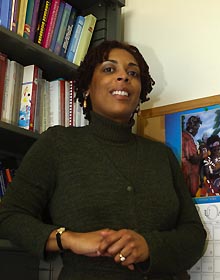|
This is an archived article.
For the latest news, go to the Advance
Homepage
For more archives, go to the Advance Archive/Search Page. |
||
|
Researcher Seeks To Reduce Bias In
Language Assessments
By Sherry Fisher A five-year-old girl named Julia changed Valerie Johnson's professional career. "Julia was not only on my speech caseload, but she had also been diagnosed as learning disabled," says Johnson, an assistant professor of communication sciences, who specializes in language acquisition and disorders.
"I wondered why she was there," says Johnson. "She was smart as a whip." Johnson met the child while working in a public school after completing her master's degree at Florida State University. Julia was being tested to see if she could remain eligible to receive special education services. She gave appropriate answers on tests, but gave them in a 'different form' than other children in the school, says Johnson. The child was speaking a dialect known as African American English. Johnson, the daughter of an army officer, grew up "all over the world." She learned Standard American English. "For a long time, I thought anything other than that just wasn't correct," she says. But meeting Julia changed that. "From that point on, my goal was to get some answers for little Julia," says Johnson, who is African American. "There was so much I wanted to know." Today, Johnson's research involves developing assessment tests for children whose dialects are other than Standard American English. She is particularly interested in children who enter school systems in the United States speaking African American English. "African American English is not bad English," Johnson says. "It's not broken English. It's rule-governed just like any other language." According to Johnson, many black children come from families and communities where the African American dialect is spoken. While these children may not have difficulties with speech and language development, they do sound different from their peers who speak Standard American English, and are more likely to be sought out and tested for speech or language disorders. When given assessment tests for possible problems, these children may be misdiagnosed: Almost all standardized tests are designed to identify children who speak mainstream or Standard American English. "Consequently, children who have no problems may be placed into special education or speech therapy," Johnson says. She wants to change that and has focused her research on developing tests to assess children who speak African American English. "It's my passion," she says. "We need reliable tests." According to Johnson, children ages four to seven who are just starting school may be identified as language-impaired. "How do I test a child whose underlying grammatical structures are different than what this test is based on?" she asks. "Or, there may be words that a child may not be familiar with based on his or her experience. We need to be able to distinguish between a child with a true language disorder and one who is exhibiting a language difference." In the Test of Language Development, Johnson says she found some items that could skew results. "For example, when a child is asked to give a definition of sugar, some African-American children would say it has something to do with blood, while the acceptable response would be about something sweet, Johnson says. "These children often hear the word 'sugar' relating to diabetes - which is prevalent in the black community - as in the expression 'he has sugar'." According to Johnson, tests that reflect children's capacity to learn - rather than their knowledge or experience - are better diagnostic tools. "There are many tests to assess what a child already knows," Johnson says. "That can be problematic for children who don't have enriched backgrounds. Instead of testing how many words a child knows, for instance, I ask 'What is a child capable of learning?'" Johnson cites as an example a nonsensical word repetition task that she says has become a good screener for speech and language disorders: "If I make up a word and increase the number of syllables, can the child repeat it to me?" Johnson says. "Research has shown that kids who are from minority communities who have true language disorders perform poorly on that test, while children from minority communities who are just exhibiting a language difference perform as well as their mainstream peers." As part of her doctoral dissertation, Johnson developed an assessment task, which has now been incorporated into the country's first standardized test to assess language disorders in children who speak dialects other than standard English. "The test is designed to find out if a child has the capability to learn something new," she says. "It should cut down on misdiagnosis. When she was a graduate student, Johnson found little information on African American English in the curriculum. "Nobody talked about AAE, where it came from or why it is still here," she says. Even now, little is offered in the area. She learned more as a clinical supervisor at Auburn University in Alabama, became involved in some research on AAE, and later met Harry Seymour, a professor in the Department of Communication Disorders at the University of Massachusetts. Seymour became her mentor and Johnson earned her Ph.D. in communication disorders from UMass in 2000. At UConn, Johnson teaches several courses, including one on multicultural issues in speech language pathology. She says she is determined to give her graduate students the tools they need to work in the field. "Speech pathologists in some areas like Washington, D.C., might be dealing with as many as 90 different languages," she notes. "My job is to give them the tools and resources they need to validly and reliably assess a child." |

